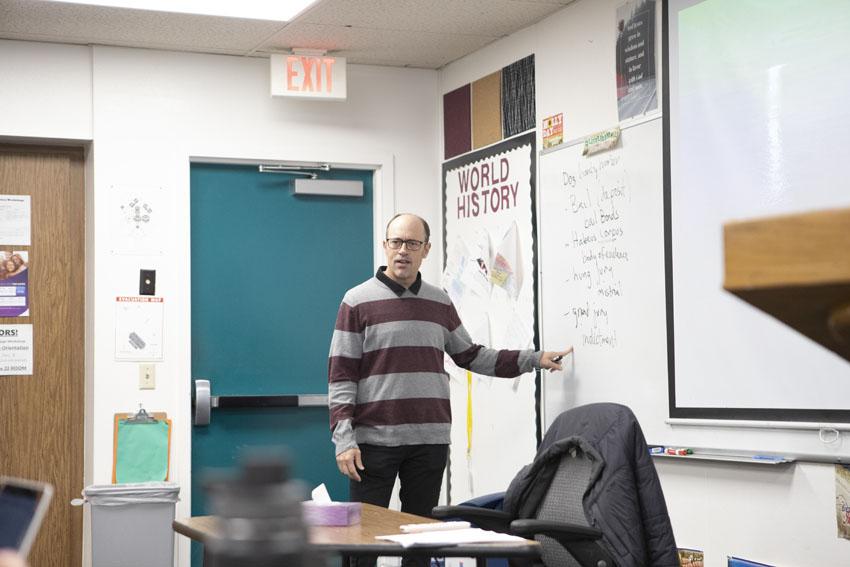Opportunities for community awareness, engagement arise

Civic responsibility is defined by Learning to Give as the responsibility of a citizen and includes engagement in government, church, volunteering and memberships of voluntary associations. This community-minded attitude is showcased throughout the US in many occupations such as soldiers, military, firefighters and various other jobs.
Participation in community events, jury service and country defense while respecting others’ opinions, rights and beliefs are all included in civic responsibility.
Civic responsibility served as the building blocks for democracy in 1787 during the founding of America and it is evident in the Preamble which states:
“We the People of the United States, in Order to form a more perfect Union, establish Justice, insure domestic Tranquility, provide for the common defense, promote the general Welfare, and secure the Blessings of Liberty to ourselves and our Posterity, do ordain and establish this Constitution for the United States of America.”
Around the 18th and 19th centuries, civic responsibility began to be represented in American communities through voluntary fire departments, public arts and the Civilian Conservation Corps (CCC).
People began to use their homemade goods, talents and occupations to benefit society. By the early 1960s, citizens became involved in political matters and presidential elections, demonstrated in the success of the Civil Rights Movement lead by Martin Luther King Jr.

After teaching the civics class on campus for 16 years, Robert Foshee shares his perspective on civic responsibility and what the practice means to him.
“Civic responsibility includes responsibilities that citizens have,” said Foshee, “This includes being a responsible, caring, productive member of society. This is important because if everyone was selfish and only looking out for the needs of themselves, nobody’s needs would be met. An example would include being a good neighbor, serving in your community, following civic authority and even recycling.”
With 42 years of teaching experience, junior high history teacher Hallie Rojeski evaluates what civic responsibility means to her. Rojeski has voted in every election since she was 21 and has served on a jury three times. She believes civic responsibility begins at home by taking care of the needs of immediate family.
“In its simplest form, civic responsibility refers to citizens doing what is needed to make their community or country clean, friendly and law-abiding,” Rojeski said. “In addition, it includes being informed on issues that affect our community, helping where possible, serving on juries and voting.”
From the perspective of an American history teacher, Rojeski also shares the importance of civic responsibility in accordance with the first amendment freedoms. She believes that keeping the power of the government limited preserves the powers and freedoms of citizens.
“Since the power exercised in our country rests with the people,” Rojeski continued, “and we willingly give some of that power to local, state, and national governmental leaders, we need to be informed on issues that affect our country and vote. Because we are a free country, civic responsibility is a part of what keeps America strong and free.”
In the following podcast, freshman Zoe Bull interviews freshman Annabelle Counts and junior Riley Goldsborough on civic responsibility.
Opportunities to practice civic responsibility include serving in a retirement home, participating in a charity walk or run or working in a community-benefiting field such as a firefighter, doctor or policeman.
Dermatologist Dr. Alan Blankenship is affiliated with Kaiser Permanente Fresno Medical Center and has worked in the medical field for over 14 years. Prior to his medical practice, Dr. Blankenship taught and researched at UC Davis and Michigan State University in the field of Environmental Toxicology. He explains what he thinks civic responsibility is.

“Civic responsibility has many layers and can be quite complicated,” Blankenship said, “when you consider what is important to each of us politically, ethically, economically, scientifically, and socially. However, civic responsibility can be simple, as a Christian, when we consider our most closely held beliefs that include loving the Lord with all of our heart, soul, mind, and strength and loving our neighbors as ourselves.”
Blankenship discusses how his occupation plays into civic responsibility, and what it means to the communities he serves.
“In the recent past, my family and I regularly participated in medical missions trips to serve the local people of the Peruvian Amazon basin,” Blankenship continued. ” I find that when we offer medical services whether locally or abroad, it meets an immediate need and develops trust so that we can find additional ways to get involved and to help the communities that we serve.”
Civic responsibility executed with integrity benefits individuals as well as communities. As Americans look back upon the expectation of civic responsibility woven into the Constitution and foundations of the US, opportunities arise that allow them to continue what the founding fathers started.
For more articles, read Language relates to personal identities, cultural differences and Cindy Lane invites visitors to Clovis area for Christmas displays.







Silva Emerian • Dec 12, 2019 at 8:21 am
Zoe! This is such a good article. It’s informative and gives the roots of civic responsibility in our country, as well as a biblical perspective and examples of how to be civic-minded. Thank you for presenting it so clearly. Keep up the great writing!